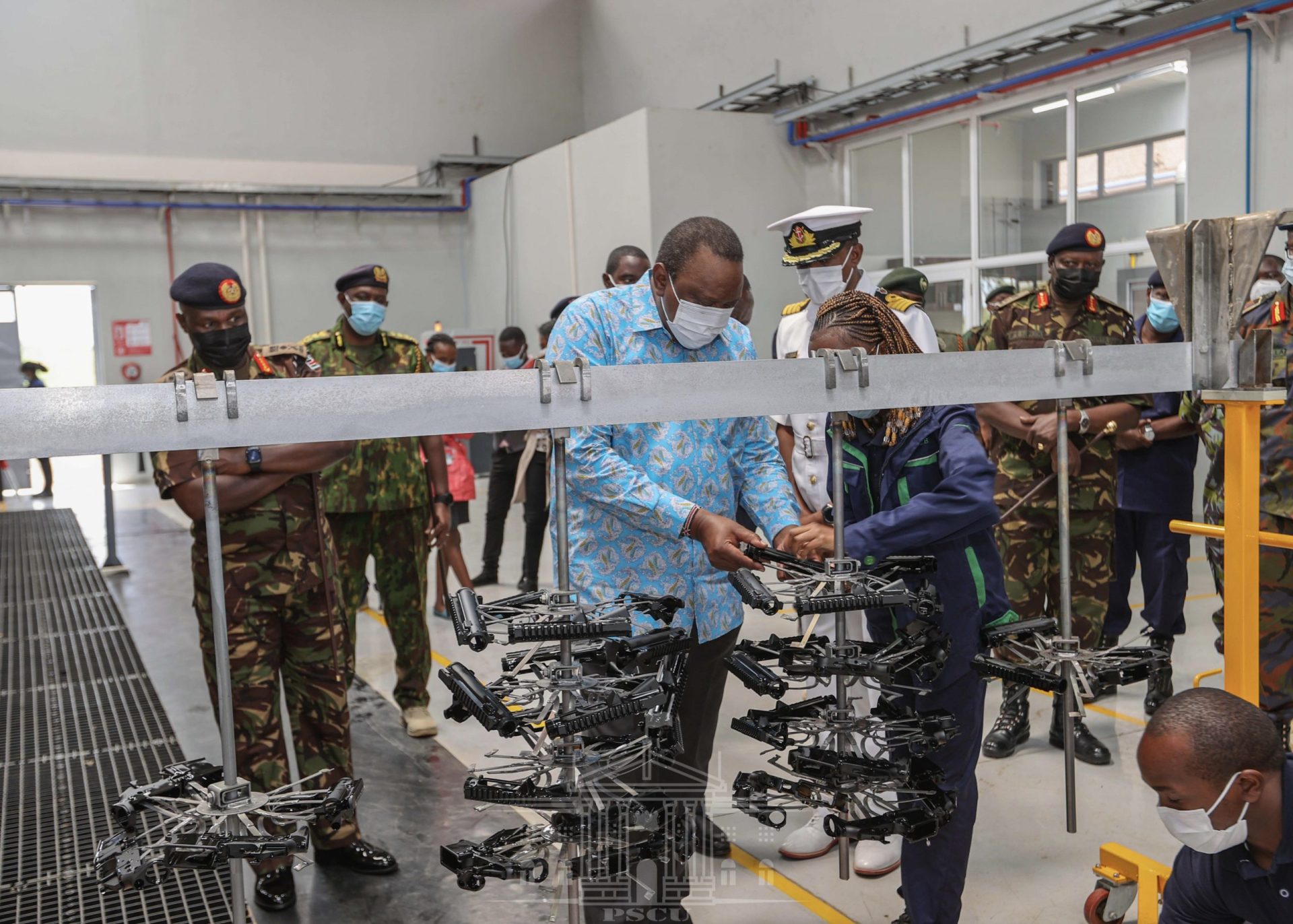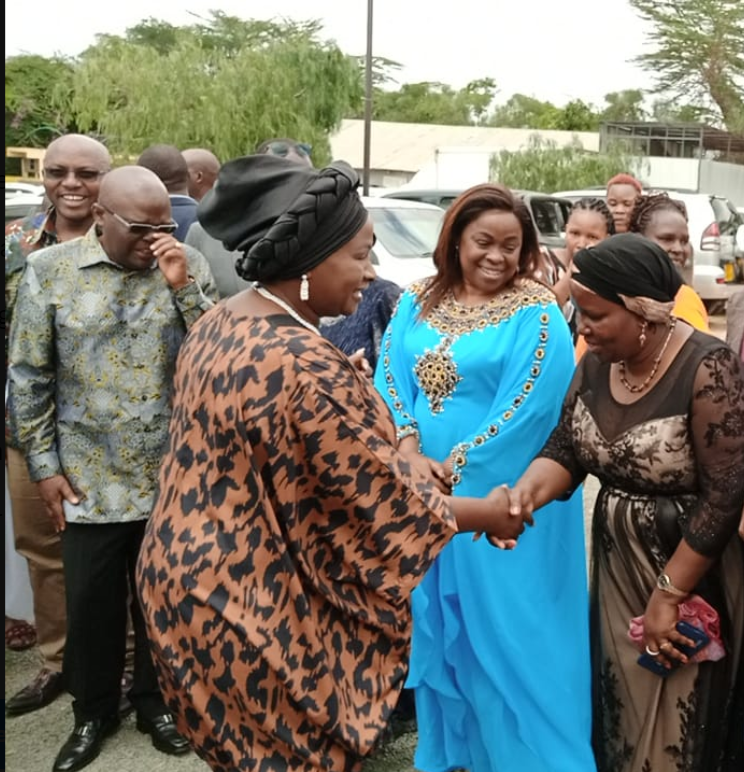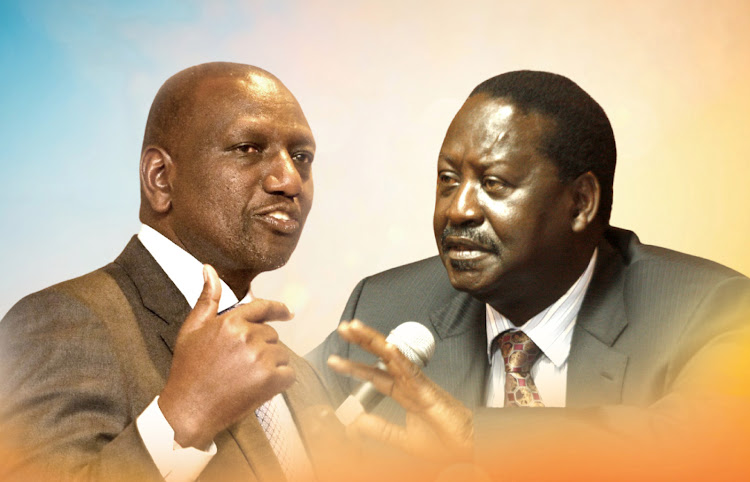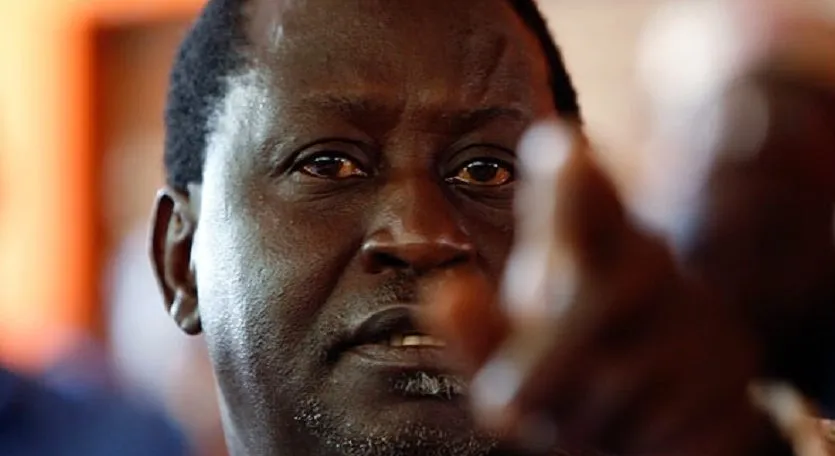Is there a way we as Kenyans can save our country from daughters and sons of imperial colonial chiefs?
I have voted for a president three times in my life – the first time being in 2002 when we had the only peaceful general election in Kenya since we gained independence.
Prior to this, and thereafter, we haven’t had a single election where people weren’t displaced and killed.
Every election brings arrows, machetes, bullets, tears and dead bodies. Power in Kenya is so sweet that some people must die in order for someone to be sworn in.
I was 18 years old when I first voted. Young, excited and very eager to see the ruling party, KANU, relinquish power and give way to the National Rainbow Coalition (NARC).
Our anthem for change was from Gidi Gidi-Maji Maji’s popular song, ‘Unbwogable.’ We were unbwogable, unbeatable…We sang it, we felt it and we believed it. I was one of the many thousands who thronged Uhuru Park and sang, “Yote yawezekana bila Moi”(Everything is possible without Moi).
I remember seeing the then Attorney General, Amos Wako, walking to his car and l jeered him. l knew he was also on his way out. I could not have been more wrong. 20 years later, he is still around.
By 2003, the atmosphere was different. We could breathe easier. Police harassment in Eastlands, where l lived, reduced. An international poll showed that Kenyans were the most optimistic people in the world. The infamous Nyayo House torture chambers were opened. Survivors and families of the victims were able to visit the dungeons, to see where they, or their kin, had been held and brutalized for fighting for democracy.
Those who served in Kibaki’s first government will attest to this; the senior politicians in the outgoing Moi regime were returning stolen money and land. Citizens started refusing to bribe the police. In those early days of the Kibaki presidency, brave citizens in Nairobi arrested a traffic police officer, who was asking for bribes, and delivered him to Central Police Station. They were rallying behind Kibaki, who had called upon all citizens to come out and support the government in fighting corruption.
Those citizens who responded to that call, with action, were arrested for assaulting a police officer. The optimism that we had quickly turned into disillusionment. The property and money that was returned by politicians from the Moi era were stolen by the Kibaki government ministers.
John Githongo whose role was to fight corruption in Kibaki’s government will tell you that he would go to a minister’s office for an appointment but the minister would not be there. On calling said minister, he would respond loudly, “I am so sorry John, l am at my construction site in Karen.”
Cabinet ministers were all over this city supervising the building of their new palatial homes and apartments. A powerful Cabinet minister once walked into the Kenya Agricultural Research Institute (KARI) and loaded the best cows there into waiting trucks. Today, he has one of the finest breeding farms in Kenya.
The wanton corruption that took place during the early days of Kibaki’s first term is documented in the book, “It’s Our Turn to Eat” by John Githongo and Michella Wrong.
Githongo – then Permanent Secretary of Governance and Ethics in the Office of the President, turned whistleblower, the man who was almost assassinated for revealing the deep rot in Kibaki’s government – is now in court facing libel charges for exposing that corruption. The thieves in Kibaki’s government stole enough to compromise the judiciary and have an innocent man put on trial, to cover their crimes.
The political parties that had formed the NARC coalition soon started fighting. But even as they fought, they also stole together. Around this time, a shocking raid was carried out on a media house for which I worked. It later came to light that the government had acquired the services of mercenaries – the infamous Artur brothers.
They were believed to be behind a number of criminal activities in the city. What raised eyebrows was the allegation that their handler was the President’s girlfriend. Today, the lawyer who did the paperwork for the Artur’s is one of the people to be interviewed to be Kenya’s next Chief Justice – a position he might get. The disillusionment did not stop there.
In a show of support for stamping out corruption, the Roads Minister declared the days of cowboy contractors were over, only for him to get one of those cowboys to build him a home in Karen. All the construction companies he had blacklisted came together, hosted him somewhere in Tsavo, then bribed him with millions of shillings in cash. And that is how not a single road contractor was ever taken to court.
Writer, Billy Kahora, once approached me to work jointly on the road construction cartels story. We soon realised that even conducting research was too dangerous. We quickly dropped it.
Meanwhile the NARC marriage was falling apart.
In November 2005, Kibaki fired all his cabinet ministers. When he named his new cabinet, Raila Odinga and his LDP side were dropped. The next two years were toxic for Kenya. The politics were tribalized and politicians fueled ethnic hatred. By the 2007 general election, it was no longer a presidential race based on any ideology, but solely on tribal supremacy.
On December 27th 2007, l didn’t get a chance to vote. l had been assigned to cover Raila Odinga as he cast his ballot in Kibra, as well as monitor the situation and the vote counting. l was registered to vote in Starehe, hence could not vote.
The aftermath of the 2007 General Election is very well documented. The election outcome was disputed and this resulted in violence that led to the displacement of people, rape and cold-blooded murders. I was a witness to some of these atrocities as l moved through Nairobi’s slums, then travelled up to Naivasha and Eldoret to record what was happening there.
A sense of normalcy ensued when peace was brokered, after a series of high powered mediation talks chaired by former UN Secretary General, the late Koffi Annan. I photographed the peace talks at Serena and the subsequent Raila-Kibaki handshake.
One of the major criticisms I receive to date is that I benefited financially from my photographic documentation of the post-election violence. The truth of the matter is that l was working as a newspaper photographer.
I was doing my job. And I was paid for doing the work assigned to me – something that is common with photojournalists from all around the world.
But l also quit my job soon after, and travelled this country showing these images for free, in an effort to preach reconciliation, heal the nation and stop the cycle of violence. It is likely that the post-election images you have interacted with were from the body of work that formed the street photo exhibition. The biggest beneficiaries of the violence have never been held accountable for their actions.
Over 500,000 people were displaced, and more than 1,000 killed. No justice for them to date, but Kenyans gloss over that and find it easier to blame a photographer for doing his work.
I wasn’t at KICC when the 2007 results were announced, but l saw Martha Karua defend Kibaki, in the same way, Orengo defended Raila Odinga. They were both agents for their respective presidential candidates. Martha Karua was the Justice Minister at Serena Hotel during the peace talks. In November 2009, she resigned from Kibaki’s government. She took issue with the unmitigated corruption and resigned on principle. That’s why l voted for her in the 2013 elections.
I read the Truth Justice and Reconciliation Commission (TJRC), Kenyan National Human Rights Commission (KNHRC), and the Waki reports. Martha Karua’s name was never mentioned in any corruption or planning of the 2007 mass murders. What is true is that she was the head of the negotiating team for President Kibaki at Serena hotel. Koffi Annan and former Tanzanian President, the late Benjamin Mkapa, called her a stumbling block – and she was. She was against the formation of a cabinet with the alleged perpetrators of the post-election violence.
She was unwilling to compromise but Kibaki and Raila , who both knew what their “generals” did to protect their wins, were willing to form a coalition government with murderers for the sake of “peace”.
The grand coalition government, with Kibaki as President and Raila as Prime Minister, was the grand theft coalition. Martha Karua had a big name but she wasn’t one of the Kibaki boys and that’s why Uhuru was chosen to be the Deputy Prime Minister. He had the money, the influence and the dirty hands that Martha didn’t.
The grand coalition government of 2007-2013 became the grand looting coalition – you can read more about this in Miguna Miguna’s book, Peeling Back The Mask. The only good thing that Kibaki and Raila achieved was following one of the peace accord agreement conditions bypassing the 2010 Constitution.
In 2013, I voted for Martha Karua because she was the only one who campaigned to uphold and respect the rule of law; something the Kibaki and Raila coalition had failed to do. She had resigned on principle as a result. As we all know, Uhuru and Ruto won that election, amid allegations of rampant rigging.
President Uhuru’s first term was as expected – looting, murder and intimidation of opponents. People who fought against corruption, myself included, were labelled puppets of the West.
Journalists who were critical of the government were fired after Uhuru made calls to their workplaces. That’s how Editor, Dennis Galava, and Cartoonist, Gado, lost their jobs at the Nation Media Group.
If a media house became too critical, the government would cut advertising with them, causing loss of revenue. Between 2013-2017, the government through the Auditor General, admitted that we were losing Sh600 billion a year through corruption.
Just recently, Uhuru admitted that we are now losing Sh2 billion daily. The appetite for theft has grown. The muzzling of media houses has been a resounding success.
When I led protests in the streets, the government gave bloggers the work of tarnishing my reputation. They threw mud at me, accused me of all manner of things, including teargassing kids. Francis Kimemia, the Chairman of the National Security Advisory Committee and the Secretary of the President’s Cabinet, even accused John Githongo, Rev. Timothy Njoya and I, of trying to overthrow the government in 2014.
It was a ludicrous accusation as we had no plans to do anything of the sort, but if what we had planned to do on February 13, 2014, had succeeded, Kenya would be on a different trajectory today.
However, we were betrayed and the protest we had planned to march all the way to Parliament was cut short even before it began. Parliament went on to pass laws to take away the independence of the National Police Service.
The targeting of people who were critical of Uhuru was bad. Eric Wainana wrote an article for The Star saying he couldn’t vote for two men accused of crimes against humanity and that’s how he has never performed at any government function since.
When Kenya turned 50, he was dropped from the lineup of artists who performed at Kasarani. I was one of the photographers for Safaricom but l was dropped because of my criticism of Uhuru’s government. Business came first.
After the 2014 accusation of trying to overthrow the government, we regrouped and decided to form a political party. We thought that if we couldn’t protest, we should try and run for public office and fight the system from within.
We formed Ukweli Party and after a lot of back and forth, that involved going before the political tribunal multiple times, we were registered in early 2017 – just a few months before the elections.
Between 2013 and 2017 Raila Odinga exposed corruption in government, notably the NYS, SGR and Eurobond scandals. He told us about the Muranga death tunnels that cost Sh6.8 billion and took water to the Kenyatta Northlands in Ruiru.
That’s why, in 2017, I voted for Raila Odinga. He wasn’t perfect – the pro-democracy Raila of the 90’s wasn’t the same person – but I believed he represented the best chance for Kenya in 2017.
President Uhuru was announced the winner, again, in another hotly disputed contest. The Supreme Court nullified the election and Raila boycotted the rerun, citing an unfair playing ground. The servers that were used to steal the 2017 elections were never opened for scrutiny.
After some spirited opposition following Uhuru’s second win, Raila decided to reconcile with Uhuru in the now infamous handshake. The handshake gave Uhuru the legitimacy he badly needed and the license to continue the trend of reckless borrowing.
In return, Uhuru promised to destroy the Constitution and give Raila whatever he wants. That’s how BBI was created, a Constitution mutilation process that will only create positions for more men to eat.
How is activism, one might wonder? It’s a very lonely journey. You’re constantly misunderstood, accused of all manner of things, and fought at every turn by strangers on the payroll of those you’re exposing. But the cause is greater than any barrage of insults and constant trolling, so you soldier on, taking breaks when you can, so as to maintain your strength and sanity.
The people stealing Sh2 billion daily have taught you to hate and abuse those who call them out. Instead of supporting those who expose evil, you fight and abuse them.
Politicians have lied to Kenyans that no one can genuinely fight for a better Kenya without getting paid, and because Kenyans sell their votes at every election, they have believed that lie.
You fight and abuse activists, while you celebrate those who steal, rape and murder you.
But Kenyans are not unique in that sense. From the days of Jesus Christ, to Malcolm X, to Wangari Maathai, the people have always betrayed those who fought for them.
A 1967 poll in the US said Martin Luther King Jr. was one of the most hated men in America. Today, we have Martin Luther King Jr. Day. So while the struggles that Jesus, Malcolm, Oneko, Kaggia, Chelagat, and Wangari Maathai were involved in may not be the same as ours, active citizens shouldn’t give up or sell out just because we fear being hated, or labelled negatively.
How do we save Kenya? Do you know that Koigi Wamwere, Chelagat Mutai, James Orengo, Mwashengu wa Mwachofi – some of the so-called 7 bearded sisters – were all KANU members of Parliament at one time?
They were the opposition in Parliament in the 1980s, while elected on a KANU ticket. Kenya was a one-party state but they fought and represented Kenyans in Parliament, even if it meant going against their own party.
We need to elect people who can represent our interests in County Assemblies, in Parliament, and the Senate.
The destruction of Kenya can only be stopped if we get the right people in those offices. Today, our democracy is worse than during the Moi days.
Members of Parliament who oppose the government aren’t given a chance to speak in Parliament, and when they speak outside, Uhuru and Raila expel them from their parties.
That’s the highest level of intolerance. Raila has decided no person can rise in areas where he is dominant, without seeking his “blessings.” So it’s only those who can afford “blessings” that are elected.
We have allowed ourselves to be held hostage by a few individuals who have mastered the art of tribal politics. They call themselves the tribal kingpins, their ideology is tribe.
What happens next? I was part of a group of people who believed that in 2022 we could offer this country alternative leadership.
I held several meetings with Kivutha Kibwana, and later on, Mukhisa Kituyi. I met with them together and individually. I believed that if they could form a joint ticket, we would have a credible opposition candidate, since Raila, Ruto and the rest are all now part of the Jubilee government.
I was hopeful a Kivutha-Mukhisa ticket would happen. Then l woke up one day and saw a picture of Raila, Mukhisa and Kivutha, in the papers, together and that dream of a serious bid by Mukhisa and Kivutha evaporated.
Kivutha then announced his support for BBI and my heart sank. So it’s very likely one of the usual suspects who dominate newspaper headlines will be elected president.
What we know now is that the Independent Electoral and Boundaries Commission (IEBC) and Ethics and Anti-Corruption Commission (EACC) will not bar corrupt people, drug dealers and murderers from vying.
They won’t. Now, your role is to ensure that even if the President’s seat goes to a very evil person, you must elect the right MCAs, MPs, Senators and Governors.
Your quality of life will be determined by the quality of your vote. Stop voting for the big party, or tribe.
Choose men and women who will go work for you. Remember that anyone who bribes you to vote for them is going to steal your taxes.
I lost in 2017, partly because l didn’t bribe anyone, whereas my opponent bribed everyone and now the people are regretting because he’s doing nothing for them. If someone bought your vote, you ate his money and he must recover what he spent, so stop complaining.
If you ran for a seat in the last election, or you hope to run in this coming one, and you’re also a person of integrity who understands what it means to be a servant leader.
Join Ukweli Party. Ukweli Party is a social democratic national political organization and movement of diverse citizens, working together towards a Kenya that is governed democratically and competently. You can become a member at www.UkweliParty.org. Email us: [email protected].
By Boniface Mwangi


















